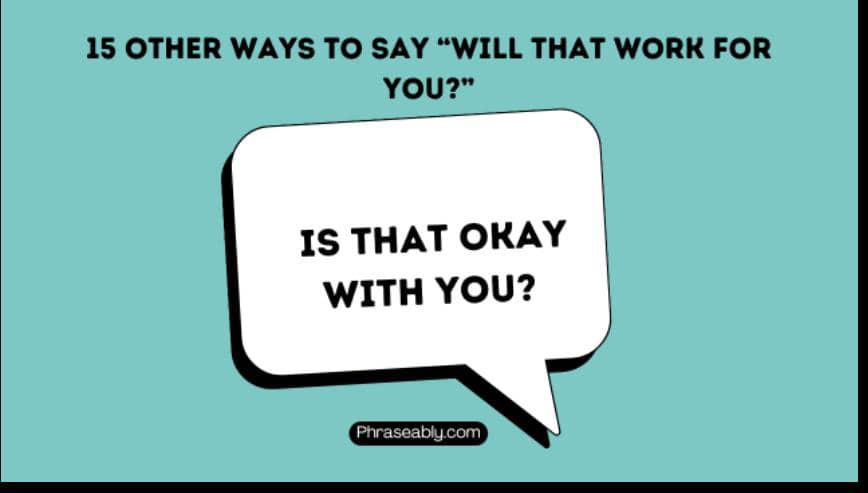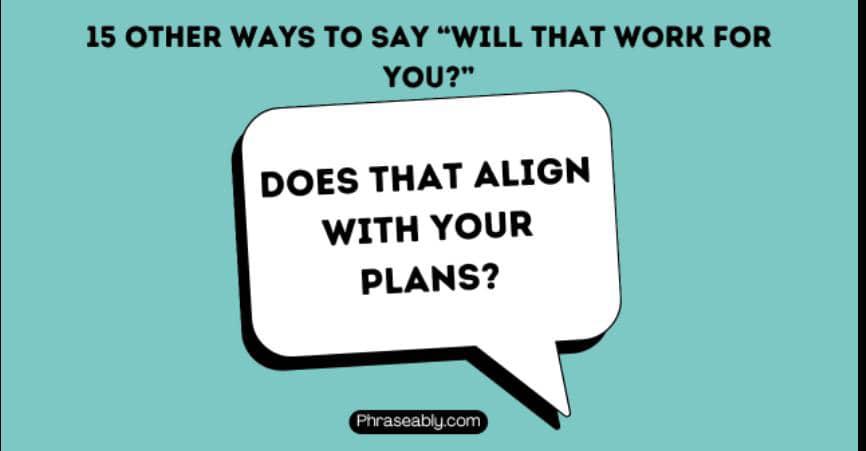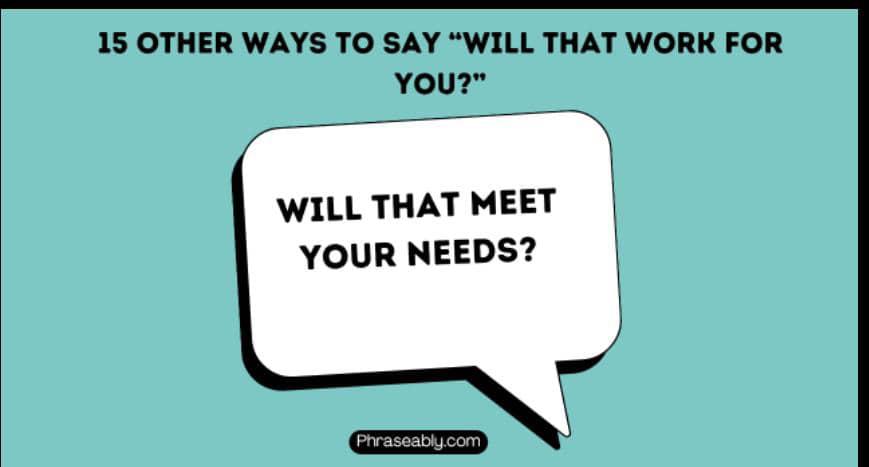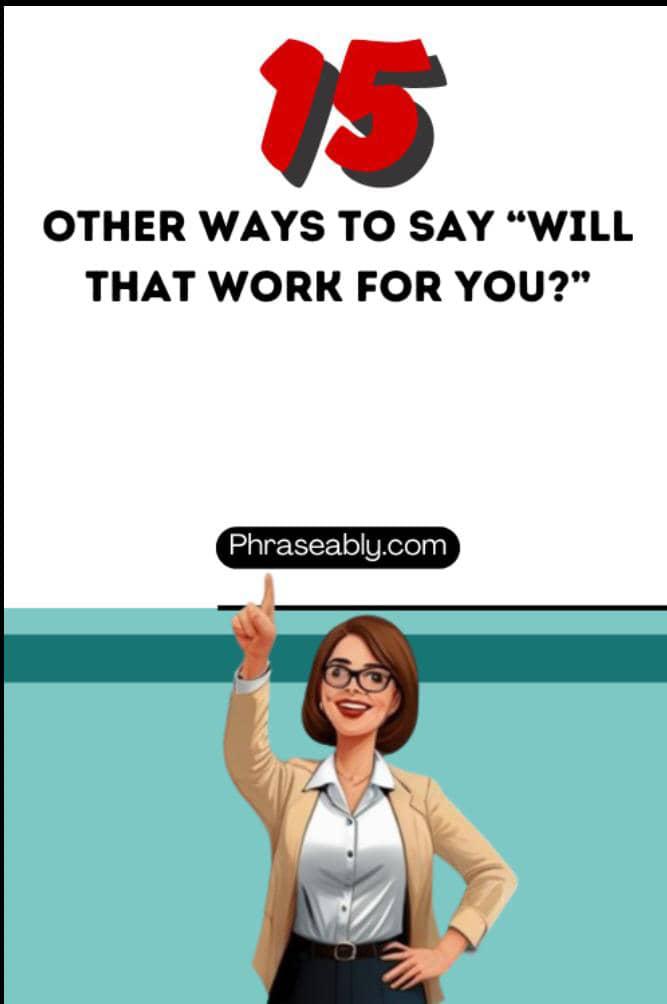“Will that work for you?” is a common question we ask in casual conversations when we want someone to agree with us or confirm something. It’s a polite way to ensure that plans, ideas, or actions are acceptable to everyone involved.
However, overusing this phrase can make your communication feel repetitive and redundant.
In this article, I explored 15 alternative ways to express the same saying, providing you with a richer vocabulary to make your conversations more engaging and dynamic.
Each alternative is accompanied by practical examples to illustrate its usage in different contexts, ensuring that you can seamlessly integrate these phrases into your communication.
What to Say instead of “Will That Work for You?”
Here are fifteen different ways to ask if something is agreeable or acceptable, which is typically used to confirm someone’s approval or agreement:
- Does that suit you?
- Is that okay with you?
- Will that be suitable?
- Does that sound good?
- Are you on board with that?
- Is that acceptable?
- Can you agree to that?
- Does that align with your plans?
- Will that be convenient?
- Is that feasible for you?
- Can we move forward with that?
- Will that meet your needs?
- Does that fit with your schedule?
- Is that manageable?
- Are you comfortable with that?
1. Does That Suit You?
“Does that suit you?” is a slightly more formal way of asking if something is acceptable. It suggests a level of accommodation and consideration for the other person’s preferences or circumstances.
Usage Example:
After proposing a new meeting time, the project manager asked, “I’ve moved our discussion to 3 PM. Does that suit you?”
This phrase is particularly effective in professional settings where you want to ensure that your plans align with the other person’s needs without coming off as overly casual.
2. Is That Okay with You?

This phrase is a more informal and straightforward way of seeking approval. It’s a versatile option that can be used in both personal and professional contexts.
Usage Example:
When discussing dinner plans with a friend, you might say, “I’m thinking of ordering pizza tonight. Is that okay with you?”
It’s simple and direct, making it perfect for everyday conversations where you want to keep things light.
3. Will That Be Suitable?
“Will that be suitable?” is a phrase frequently used in professional settings to ensure that a proposed solution or plan is appropriate and meets the necessary criteria.
Usage Example:
A consultant, after reviewing a client’s needs, might ask, “If we implement these changes by next quarter, will that be suitable for your team?”
This phrase works well when you need to confirm that a plan will meet specific standards or expectations.
4. Does That Sound Good?
This expression is commonly used in casual settings when suggesting ideas or making plans. It’s a friendly way to seek agreement while maintaining an easygoing tone.
Usage Example:
After suggesting a movie to watch, you could ask, “How about we watch that new comedy tonight? Does that sound good?”
It’s an inviting phrase that helps keep the conversation relaxed and open.
5. Are You on Board with That?
“Are you on board with that?” is a phrase often used to confirm that someone is in agreement and committed to moving forward with a plan or idea. It’s particularly effective in teamwork or collaborative settings.
Usage Example:
During a team meeting, as a leader you might ask, “We’ve decided to proceed with the new marketing strategy. Is everyone on board with that?”
This phrase not only seeks approval but also implies a commitment to the agreed-upon course of action.
6. Is That Acceptable?
This phrase is slightly more formal and is used to ask if a proposed idea or solution is agreeable. It’s a polite way of seeking confirmation without putting pressure on the other person.
Usage Example:
A customer service representative might say, “We can offer you a refund or a replacement product. Is that acceptable to you?”
It’s a considerate way to ensure that the other person’s needs are met while keeping the conversation respectful.
7. Can You Agree to That?
“Can you agree to that?” is a direct question about someone is willingness to accept a proposal or condition. It’s often used in negotiations or discussions where mutual agreement is essential.
Usage Example:
During contract negotiations, a lawyer might ask, “We’ve outlined the terms in this document. Can you agree to that?”
This phrase is useful when you need clear confirmation that all parties are in agreement.
8. Does That Align with Your Plans?

This expression is often used when trying to coordinate schedules or plans with someone else. It suggests a thoughtful consideration of the other person’s existing commitments or preferences.
Usage Example:
When scheduling a business trip, you might ask a colleague, “We’re planning to depart on the 15th. Does that align with your plans?”
It’s a phrase that shows you’re making an effort to accommodate the other person’s schedule or priorities.
9. Will That Be Convenient?
“Will that be convenient?” is a polite way to ask if a proposed time, place, or action is suitable for the other person. It conveys a sense of thoughtfulness and consideration.
Usage Example:
A doctor scheduling a follow-up appointment might ask, “I have an opening at 10 AM tomorrow. Will that be convenient for you?”
This phrase is ideal for ensuring that your plans do not cause any inconvenience to the other person.
10. Is That Feasible for You?
This phrase is used to determine if a proposed plan or action is practical or possible for the other person. It’s a great way to ensure that your ideas are realistic and achievable.
Usage Example:
When planning a project timeline, a team leader might ask, “We’re aiming to complete this phase by next Friday. Is that feasible for you?”
It’s a phrase that shows you’re considering the other person’s ability to meet the proposed expectations.
11. Can We Move Forward with That?
The phrase “Can we move forward with that?” is frequently used in decision-making processes to ensure that everyone is ready to proceed with a plan or idea. It’s a phrase that encourages action and progress.
Usage Example:
After finalizing the details of a project, the project manager might ask, “We’ve covered everything on the agenda. Can we move forward with that?”
This phrase is effective in situations where you want to ensure that everyone is ready to take the next step.
12. Will That Meet Your Needs?

This phrase is particularly useful in customer service or client-focused environments where you need to confirm that a solution or product will satisfy the other person’s requirements.
Usage Example:
A sales representative might ask, “This package includes everything you’ve requested. Will that meet your needs?”
It’s a phrase that emphasizes your commitment to meeting the other person’s expectations.
13. Does That Fit with Your Schedule?
“Does that fit with your schedule?” is a phrase used to confirm that a proposed time or date is convenient for the other person. It’s often used when coordinating appointments or meetings.
Usage Example:
When planning a lunch meeting, you might ask, “I’m available at 1 PM. Does that fit with your schedule?”
This phrase helps ensure that your plans are aligned with the other person’s availability.
14. Is That Manageable?
This phrase is used to confirm that a task, plan, or deadline is within the other person’s ability to handle. It’s a considerate way to ensure that you’re not overburdening someone.
Usage Example:
A supervisor may ask, “I understand this is a tight deadline. Is that manageable for you?”
It’s a phrase that shows empathy and understanding of the other person’s workload or capabilities.
15. Are You Comfortable with That?
“Are you comfortable with that?” is a phrase that checks if the other person feels at ease with a proposed plan or decision. It’s a thoughtful way to ensure that everyone is on the same page.
Usage Example:
When discussing a sensitive topic, you might ask, “We can discuss this now or later—are you comfortable with that?”
This phrase is ideal for creating an open and supportive atmosphere where the other person feels heard and respected.
about sensitive subjects or trying to be understanding and empathetic.
In Summary
You can improve your ability to connect with others by adding these 15 “Will that work for you?” alternatives to your communication toolbox.
Whether you are interacting with people informally, in a professional setting, or handling delicate situations, having a wide range of expressions at your disposal enables you to adapt your language to the situation.
This helps you create stronger, more respectful relationships in addition to increasing the efficacy and clarity of your communication

